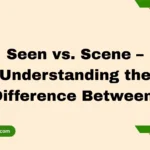The phrase “by the skin of my teeth” is a common idiom in English that people often use in daily conversations, literature, and even formal writing. This expression might sound unusual at first because teeth don’t actually have skin, but that’s what makes it such a striking and memorable phrase. Understanding its definition, meaning, and examples helps us see why it continues to be popular in modern language.
At its core, “by the skin of my teeth” means escaping a problem, danger, or difficult situation by a very narrow margin. It emphasizes narrow escapes, close calls, or barely succeeding when the odds are against you. For instance, someone might say, “I passed the exam by the skin of my teeth,” to highlight that they only just managed to succeed.
The expression has a fascinating history, with roots in biblical references and literary use. Over time, it has evolved into a powerful metaphor in everyday speech. Whether in stories, conversations, or motivational contexts, the idiom paints a vivid picture of how close a person came to failure or disaster. Exploring its origin, usage, and real-life examples reveals the richness of this timeless phrase.
Meaning and Usage of “By the Skin of My Teeth”
At its core, the phrase means to narrowly succeed at something or to escape danger with the smallest possible margin. It signals a victory, but one that feels razor-thin.
Key Points of the Meaning
- Expresses narrow escape or bare survival.
- Suggests the outcome could have easily gone the other way.
- Often carries a tone of relief mixed with disbelief.
Everyday Examples
- “I caught the last train home by the skin of my teeth.”
- “She avoided failing the class by the skin of her teeth.”
- “The player saved the game-winning shot by the skin of his teeth.”
Synonyms and Related Idioms
| Expression | Meaning |
| Close call | Narrowly avoided danger or failure. |
| By a whisker | Won or succeeded by a very small margin. |
| By a hair’s breadth | Extremely close to failure or disaster. |
| Just in the nick of time | Succeeded or arrived at the very last moment. |
Each of these expressions conveys a similar sense of scraping through when success felt almost impossible.
Literal vs. Figurative Sense
The literal meaning of “by the skin of my teeth” doesn’t make sense because, of course, teeth have no skin. This odd image is what makes the phrase memorable.
Figuratively, it means barely escaping failure, loss, or harm. The strange metaphor exaggerates just how slim the margin was. It’s almost as if the speaker is saying, “I got through by something that doesn’t even exist.”
Why Figurative Language Matters
- It grabs attention.
- It creates imagery in the listener’s mind.
- It makes language more emotional and engaging.
Idioms like this survive because they’re dramatic, visual, and memorable.
Origin and Historical Roots
The earliest known use of the phrase appears in the Bible, in the Book of Job (19:20). In the King James Version (1611), Job laments his suffering with the words:
“My bone cleaveth to my skin and to my flesh, and I am escaped with the skin of my teeth.”
Here, Job describes barely surviving his trials, a feeling of clinging to life with nothing left.
Translation Nuances
- In the original Hebrew, the wording suggested “gums” rather than literal skin.
- Early translators turned it into “skin of my teeth,” creating a striking and poetic phrase.
Evolution Through Time
- 1611: King James Bible popularized the idiom in English.
- 17th–18th centuries: Writers began adopting it in secular contexts.
- Modern era: It became a common phrase for survival or narrow success.
The idiom’s strange wording may be exactly why it endured. Its mystery gave it staying power.
Adoption in Literature and Popular Culture
Once the phrase entered English, it quickly found a home in literature, music, and film. Writers loved it for its intensity and its biblical weight.
In Literature
- James Joyce’s Ulysses (1922): The phrase appears as Joyce explores the chaos of modern life.
- Mark Twain’s works: Twain occasionally used similar biblical idioms to add humor and depth.
In Pop Culture
- Music: Megadeth released a song called Skin o’ My Teeth in 1992.
- Movies/TV: Characters in dramas and thrillers often use the line after surviving near-death situations.
- Headlines: Journalists still lean on it to describe election results, sports matches, and financial close calls.
Why Creators Love It
- It carries drama instantly.
- It’s widely understood yet still feels poetic.
- It connects the modern world to ancient imagery.
Real-Life Applications
This idiom isn’t confined to literature—it shows up in everyday life whenever people face close calls.
Examples from Daily Life
- Sports: An athlete wins a race by milliseconds.
- Academics: A student scrapes by with the lowest passing grade.
- Travel: Someone catches a flight just before the gate closes.
- Survival: A driver swerves at the last second to avoid a crash.
Case Study: Sports
In the 2008 Summer Olympics, swimmer Michael Phelps won the 100-meter butterfly final by 0.01 seconds. Commentators worldwide described it as victory “by the skin of his teeth.” It was one of the closest finishes in Olympic history.
These real-world moments highlight why the idiom is so powerful—it captures both the tension and the relief.
Variations and Global Counterparts
Different cultures have their own colorful ways of describing close escapes. While “by the skin of my teeth” is English-specific, similar phrases exist worldwide.
| Language | Expression | Literal Translation | Meaning |
| German | “Haarscharf” | Hair-sharp | Barely, by a hair’s breadth. |
| French | “À un cheveu près” | By a hair’s distance | Just barely missed. |
| Spanish | “Por un pelo” | By a hair | Narrowly escaped or succeeded. |
| Urdu | “Bal bal bachna” | Escaped by a hair | Avoided danger at the last moment. |
These parallels show how universal the human experience of near-misses is.
Why the Idiom Persists Today
Despite its strange wording, “by the skin of my teeth” remains alive in modern speech. Why? Because the feeling it expresses is timeless.
Reasons for Its Longevity
- Universality: Everyone has faced a close call.
- Imagery: The phrase sparks imagination.
- Drama: It’s more impactful than simply saying “barely.”
- Cultural depth: Its biblical origin adds weight and resonance.
In a world where language constantly evolves, idioms like this remind us of our shared human experiences—fear, relief, and survival.
Conclusion
The phrase “by the skin of my teeth” continues to hold a strong place in English idioms because of its vivid imagery and timeless meaning. It highlights the idea of narrow escapes, barely surviving, or just managing to succeed against the odds. With its roots in biblical text and its continued use in everyday conversations, literature, and motivational contexts, the idiom demonstrates the power of figurative language in expressing intense situations.
By learning its definition, origin, and real-life examples, you not only improve your understanding of the phrase but also enrich your communication. The next time you face a close call or just scrape through a challenge, you’ll know exactly when to say you made it “by the skin of your teeth.”
FAQs
Q1. What does “by the skin of my teeth” mean?
It means to narrowly escape failure, danger, or difficulty — succeeding by the smallest possible margin.
Q2. Where does the phrase come from?
The idiom originates from the Book of Job in the Bible, where it describes surviving with almost nothing left.
Q3. Can this phrase be used in formal writing?
Yes, but it’s best suited for figurative expressions, storytelling, or descriptive writing, rather than very formal academic texts.
Q4. Is it still commonly used today?
Absolutely. People use it in both casual conversations and literature to describe close calls.
Q5. Can you give an example sentence?
“I caught the train by the skin of my teeth, just as the doors were closing.”

Grace Marie is the dedicated writer behind GrammarPaths.com, where she shares her passion for English grammar, idioms, and writing mastery. With a strong background in language studies and years of experience helping learners improve their communication skills, Grace creates clear, practical, and engaging content that makes English easy to understand.












